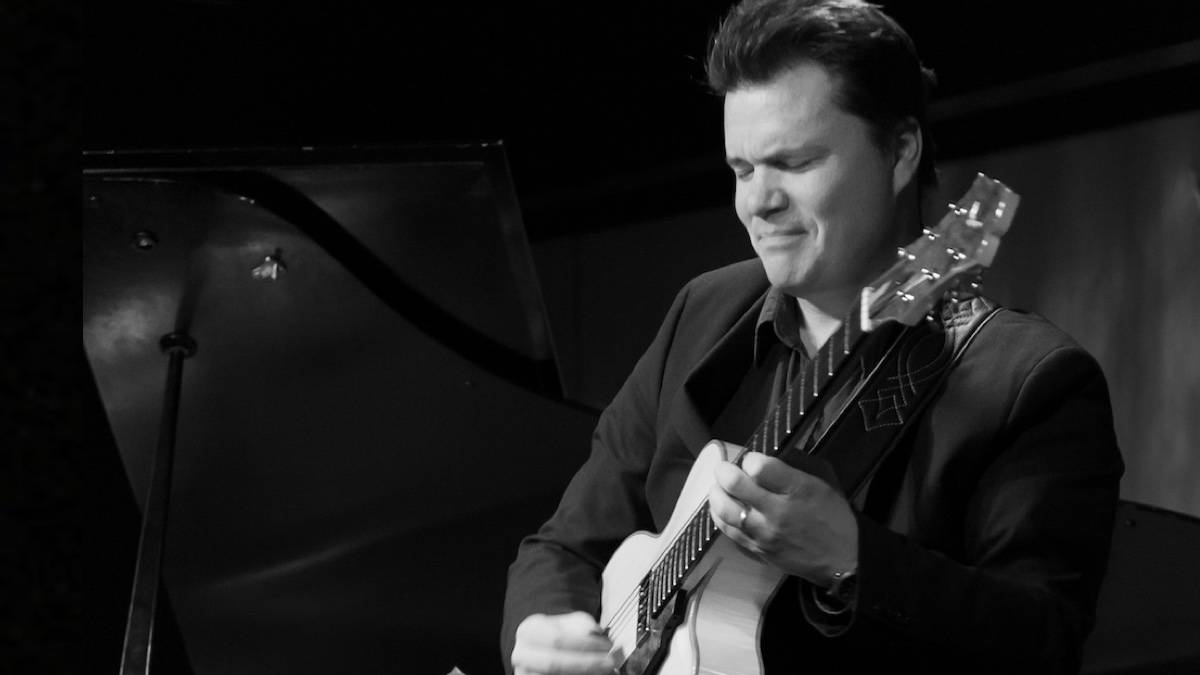Features
10 Albums That Influenced My Approach To Solo Guitar

JGT Exclusive: Guitarist and educator Sean McGowan shares ten albums that influenced his approach to solo guitar.
Jazz Guitar Today will feature Sean McGowan on our September 2023 cover – check back for the full interview and more!

1) Earl Klugh – Solo Guitar – When this first came out, I listened to it on cassette every night on my Walkman when I went to sleep. I couldn’t believe it was just one person playing all those parts – let alone with such impeccable tone, control, phrasing & feel, plus such captivating harmonies. He could play like Chet Atkins when going for a stride piano sound and play such beautiful ballads and lines with his lush, perfect sound. In my mind, he perfected Lenny Breau’s pianistic approach to the guitar.

2) Tuck & Patti – Tears of Joy – This album represented to me a stunning departure from what I was accustomed to hearing from voice/guitar duos, which were mostly rubato ballads. Tuck’s accompaniment style was fresh and exciting, from his relentless uptempo swing basslines & comping to beautiful ballads laden with harmonics, to deep funk grooves. I think this record set a new standard for the possibilities of voice/guitar duos.

3) Tuck Andress – Reckless Precision – Released not long after Tears of Joy, this recording was also in constant rotation. This recording has it all: Tuck’s unique sound and approach, unorthodox chord voicings, beautiful voice-leading, complex multiple parts, harmonics, percussive backbeats, and infectious grooves. This was my textbook for how to play solo guitar back in the 1990s.

4) Joe Pass – Blue for Fred – Of course, Joe is the master of solo guitar, and this record – his tribute to Fred Astaire – is my favorite of his solo guitar albums. His tone is full and bright, and the constant ebb and flow of his swinging time feel balanced with free-flowing solo lines is addictive. Joe could switch between time and rubato so effortlessly and fluidly, and when he was in time, there was no question about it! Virtuosity blended with spontaneous, incredible melodic sensibilities.

5) Alex de Grassi – Deep at Night – Not a jazz recording, but a masterpiece of guitar playing, arranging, and composition. This record came out around the same time as Earl’s Solo Guitar and Tuck’s Reckless Precision and was equally influential because of its majestic tone and production, plus Alex’s stunning chord voicings and harmonic directions – the same harmonies you hear in jazz but in a totally different context. Like Klugh, he has the ability to pull the melody out front and make it sing above the rest of the notes in the chord, and his use of alternate tunings creates chordal textures that are more akin to those of a pianist’s with clusters and large range voicings, as opposed to ‘standard jazz guitar box’ voicings.

6) Oscar Peterson – My Favorite Instrument – I love the spirit and energy of this record. Of course, Oscar swings like crazy and there’s no shortage of unbelievably virtuosic lines and octave passages (check out “Perdido”!) But you also get to hear Oscar’s harmonic conception and beautiful touch on ballads. His lyrical playing and chord substitutions on “Little Girl Blue” sound like Debussy or Ravel. Deeply inspiring.

7) Thelonious Monk – Thelonious Alone in San Francisco – Monk always sounds fresh and unique – especially in a solo context. From the opening chord of “Ruby, My Dear”, you’re listening to something magical. His deep, swinging rhythm always informing his ingenious melodic lines – so free and original. Even when he’s playing something like, “This Is My Story, This Is My Song” (from Straight, No Chaser) it sounds so unique and personal. I was so inspired by his approach to solo piano (and music in general), I recorded a full-length album of all Monk compositions for solo guitar in 2011 titled, Sphere.

8) Bill Evans – Alone (Again) – As with Monk and Peterson, you get Bill Evans’s starkly beautiful sound in an intimate and distilled performance. It’s interesting to hear how pianists approach – and solve the problems of – playing solo in time. Monk would often defer to a classic stride style and Oscar would keep low bass notes going in time under a flurry of right-hand lines, whereas Bill played more sparsely, supporting his long inventive lines with little three- or four-note cluster voicings with no bass. That was refreshing and inspiring in the sense that I realized I could leave things out, create space, and let sound linger in the air without always trying to play bass, chords, and melody at the same time.

9) Bobby McFerrin – The Voice – Bobby’s sheer vocal prowess, ingenuity, and playfulness are the driving forces behind this landmark solo voice recording. When I first heard “Blackbird”, I couldn’t believe it, and he has remained an inspiration with his imagination and pure delivery of music.

10) Take 6 – Take 6 – This is how I want to play guitar! I first heard this record in high school, and it completely blew me away. I’ve since studied a lot of a cappella music and arrangers, but I had never heard anything like those opening chords of “Gold Mine” before. Amazing harmonies, perfect intonation, flowing rhythmic feel, and soulful delivery. Perfection.
Jazz Guitar Today will feature Sean McGowan on our September 2023 cover – check back for the full interview and more!
Subscribe to Jazz Guitar Today – it’s FREE!
-
Jazz Guitar Lessons2 weeks ago
New JGT Guitar Lesson: Analyzing “Without A Song”
-
Jazz Guitar Lessons4 weeks ago
New JGT Guitar Lesson: Considering “Falling Grace”
-
Artist Features1 week ago
New Kurt Rosenwinkel JGT Video Podcast – July 2024
-
Artist Features2 weeks ago
JGT Talks To Seattle’s Michael Eskenazi



















